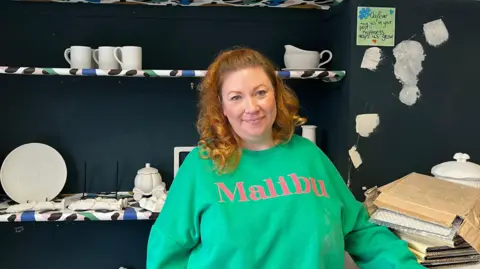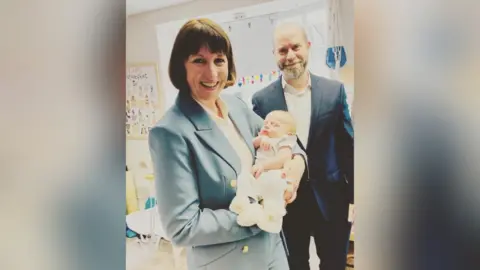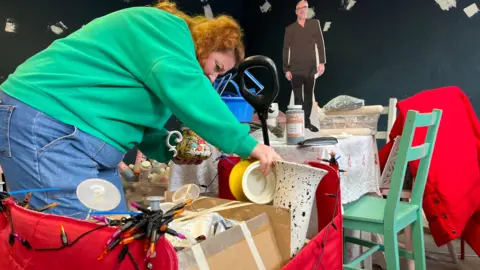'Shutting up shop feels like a bereavement'
 Louise Fewster/BBC
Louise Fewster/BBCDanielle Cooper carefully places her homemade ceramic jugs and vases into a trolley ready to be donated to charity.
There is an air of sadness in her pottery shop on the high street in Tadcaster, as the mum-of-three remembers fondly creating and painting them.
Mrs Cooper, 44, has decided to shut the doors to Glazed and Confused Ceramic and Art Studio due to rising costs and mounting debt.
"Because I have a young family I just feel like I've sentenced them to a few years of very difficult living and I feel absolutely horrendous for that," she said.
"I feel like a massive failure."
'It's really heart breaking'
Mrs Cooper, who is originally from Missouri in the US but now lives in Church Fenton, said one of the biggest challenges she faced had been her electricity costs, which increased from £150 a month to about £600.
As a result she is now £2,000 behind on her electricity bill as well as struggling to keep up with the rent and pay back her £17,000 start-up loan.
"It's really heart breaking," she said.
"It's a grief, a death that I'm having to grieve for a while".
The Federation of Small Businesses (FSB) said in its recent business confidence survey that 47% of respondents cited utilities as a major concern for them, just below labour costs which topped the list of business heartaches.
Both the FSB and Mrs Cooper want to see the government review and reform the business rates system, a levy based on the rental value of a commercial property, to help support small businesses.
In response, an HM Treasury spokesperson said it was "protecting the smallest businesses by taking them out of paying National Insurance and business rates completely," through the Employment Allowance and Small Business Rates Relief.
 Danielle Cooper
Danielle CooperMrs Cooper, who ran the shop for three years, said not only had electricity costs been crippling, but low footfall had not helped.
She wants to see the government give small businesses grants to help during these challenging times.
"Not grants where we have to match the funding, it needs to be a bailout grant, especially for areas like mine because the footfall isn't there and we still have bills to pay."
Mrs Cooper has decided to take her business on the road and go mobile, doing craft clubs for local schools, which she has already been trialling.
"I think having any kind of bricks and mortar, whether you are a creative person or a restaurant, it's just too difficult, the overheads are just too much."
Mrs Cooper's story is not uncommon, with a growing number of small businesses unable to cope with rising costs and low footfall, forcing them to either go mobile or sell their products online.
The latest government data shows that in the last four years there has been a drop in the number of small businesses (0-49 employees) - from 5.94m in 2020 to 5.45m in 2024.
But despite some of them feeling the impact of economic changes today, the statistics reveal there are more small businesses in 2024 than before the pandemic in 2019.
Carolyn Frank, from the FSB in North Yorkshire, said the cost of employing people in a bricks and mortar premises, as well as the cost of utilities, was making it a challenging environment.
She has joined calls for an overhaul of the business rates system so it is fair to all small businesses.
She said: "In the Budget we saw an adjustment of the hospitality and leisure rate – from 75% to 40% - and that is bringing a lot of smaller premises into a different level of business rates which is a worry too."
Ms Frank added that the FSB was working closely on the details of a small business grant paper which was mentioned in the autumn Budget to make sure issues were addressed.
 Louise Fewster/BBC
Louise Fewster/BBCThe government said it had set out steps to permanently cut business rates for the high street, although the introduction of a new business rates system would not come in until 2026 at the earliest.
The Treasury said Small Business Rates Relief exempted "over a third of properties from business rates, and the frozen small business multiplier will protect 90% of properties from inflationary increases in business rate liabilities".
Listen to highlights from North Yorkshire on BBC Sounds, catch up with the latest episode of Look North or tell us a story you think we should be covering here.
